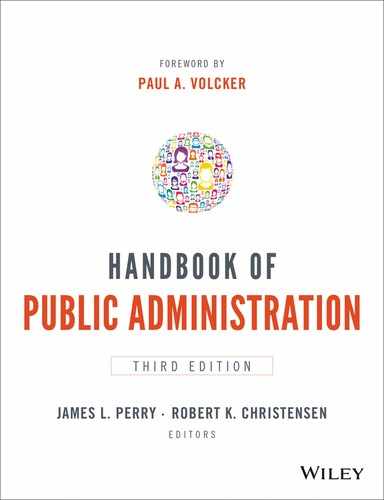Foreword
Paul A. Volcker
Those involved with this new Handbook—authors, students, scholars, practitioners—by definition share my preoccupation with effective governance.
I have spent most of my working life in government. I've seen enough of it from the inside to know something of the immense satisfactions and inescapable frustrations of public service. But beyond personal experience, I've never doubted either the importance of effective government or the need for constant vigilance by our public leaders, our educational institutions, and our citizens.
Regrettably, I have come to understand that for many people, the very words public administration conjure up a dull image of unimaginative bureaucracies mired in routine procedures. Rather, the fashion is that public attention and academic interest should be directed toward big ideas, toward “high policy,” toward vision.
Yet consider lessons right before our eyes as I write. The whole of President Obama's grand vision of universal health care was placed in jeopardy by embarrassing failures in implementation. Hopefully, that is being corrected. And then, with almost no lapse of time, large-scale administrative failures in the Veterans Administration have come to light. Those are only the latest examples of the problem. We are reminded too often about critical administrative failures—failures damaging not only to particular programs but also to public perception of the efficiency and effectiveness of government generally.
In the process, the many programs operating efficiently with satisfied citizen “consumers” are typically taken for granted, while many others lack the financial and political support to keep up with expectations.
The hard fact is that governments at all levels in the United States are heavily stressed.
Current commitments collectively entail financial requirements beyond what the public is willing to accept. Polarization of political debate and ideological differences are inhibiting effective government. At the same time, the sense of deeply seated economic travails, the strains associated with problems that are inherently international, and the rapidity of technological change seem to exceed the capacity of governments at all levels to react effectively.
Those frustrations reinforce another sense that has become increasingly apparent over the years: survey after survey confirms that trust in government is at a low point. But we don't need surveys to confirm the intensity of dissatisfaction and discord in our governing systems.
Skepticism about government and a spirit of individual liberty are a key part of the American political heritage. But when that healthy skepticism becomes corrosive cynicism about the ability of government to meet essential community needs, then democracy itself is in trouble, unable to respond with constructive and needed leadership that builds confidence and support.
Trust rests on confidence. Too often in the eyes of its citizens, government at various levels has been unable to respond effectively to the challenges of the day. No democracy—no government of the people, by the people, for the people, in Abraham Lincoln's stirring words—can flourish, or even long exist, if the people themselves have lost confidence in our governing processes.
In sum, effective public administration in my mind remains as critical as ever to the success of democratic government.
Some time ago, I ran into an aphorism of Thomas Edison, our great and innovative inventor of a century ago. “Vision” he said, “without execution is hallucination.” I am reminded too of the emphasis that some of the nation's founders placed on the importance of administration. Alexander Hamilton summed it up: “The true test of a good government is its aptitude and tendency to produce a good administration.” Now when each of our presidents recites the oath of office, he takes the constitutional responsibility to “take Care that the law is faithfully executed.”
That pledge, that commitment to the public, also guides all those challenged to call themselves public servants, well aware of the potential frustrations and criticisms but also taking pride in responding to the need to serve the policies of the Congress and the president as they in turn respond to the electorate. As Don Kettl reminds us in this book's opening chapter, public administration has been challenged and transformed by “the pace of reform, the globalization of world economies, the rise of fiscal stress, and the decline of public trust.” He goes on to say that “on an unprecedented scale,” today's governments “require highly trained, nimble public administrators with uncommon skill and an innate sense of the public interest.”
This book, in its size, the number and experience of its contributors, and the range of the issues it covers, reflects the nature of the challenge before public administrators. Fighting corruption and embracing ethical principles, long-standing elements of public service need to be honored in the new world of e-government and social media with strategies that are specific to the modern world. This third edition of the venerable Handbook of Public Administration is indeed a guidebook for all of us who strive for and demand the highest and best practices in public administration and in service of the nation.
The reward in the end for those committed, whether in office, in research, or in teaching, should be a sense of personal satisfaction and the sure knowledge that dedication to public administration is a critically important part of democratic government.
